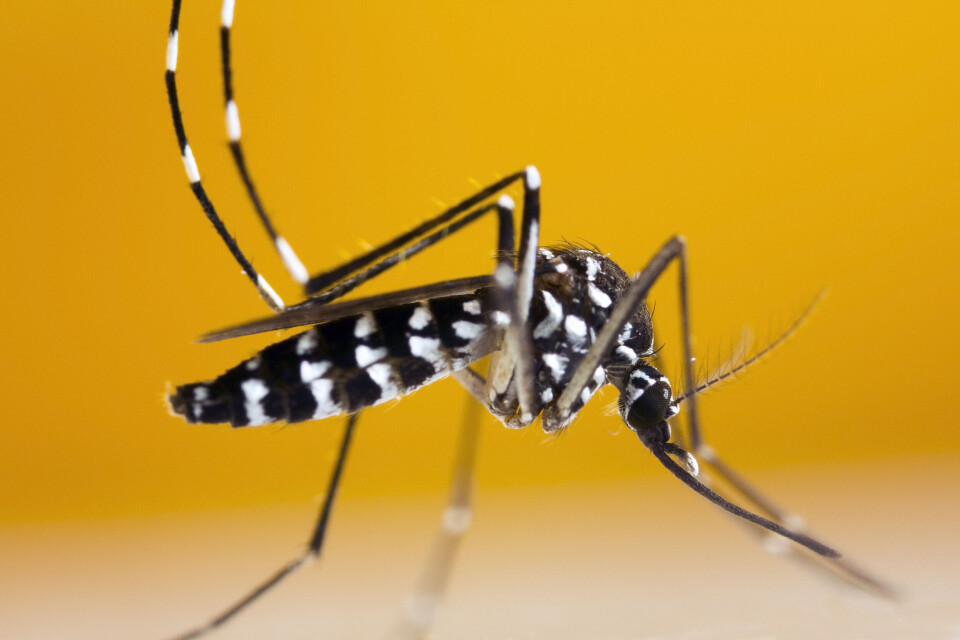-
Many Société Générale customers to be charged additional fees from April
There is some good news for international banking and instant transfers, however
-
Why gas prices in France are rising in April - and by how much
It comes after six consecutive monthly rises. Try these tips to reduce your bills
-
New notaire data suggests easing of Paris property crisis
Property experts have talked of ‘easing pressure’ and ‘breathing space’ after a four-year slump
Tiger mosquitoes: How you can help stop their spread in France
The insects can carry serious illnesses and are spreading across the country. We explain how to avoid them and what to do if you suspect a bite

Tiger mosquitoes are becoming more common in France, and there are increasing signs that they are carrying diseases like dengue fever on French soil.
They are more common in warmer weather, as higher temperatures shorten their life cycle and make it easier for them to hatch.
Here are some tips on how you can help stop their spread.
Why are tiger mosquitoes an issue in France?
Having first been identified in France in 2004, they were initially common in the south, but rising temperatures have seen them spread north.
Tiger mosquitoes are currently in 67 departments in France, and counting.
Anna-Bella Failloux, entomologist (insect expert) at the Institut Pasteur has said: “As time goes by, the mosquito is climbing its way up to the north of the country. This is because the climate allows it and because it is a mosquito that is hyper-adapted to humans, which means that it will move along with them with transport.”

Map credit: Santé.gouv.fr
The main concern about tiger mosquitoes is that they can carry several severe diseases, including dengue fever, zika, and chikungunya. These diseases are usually not associated with France and used to only affect people who had travelled to an at-risk area.
However, more cases of ‘native’ dengue have recently been reported.
In July 2022, five native cases of dengue were detected in the Provence-Alpes-Côte d'Azur (PACA) and Occitanie regions. A ‘native’ or ‘indigenous’ case means that it was identified in people who had not previously travelled to an international at-risk area, and the infection came from a tiger mosquito already within France.
This has led to the health authority la Direction générale de la santé (DGS) warning health professionals and the public to be alert to the increased risk.
Read also: France warns of increased risk of dengue fever from tiger mosquitoes
Read also: Tiger mosquitoes: new case of native dengue fever confirmed in France
How can you tell a tiger mosquito from a ‘normal’ mosquito?
Despite their ‘big cat’ name, they are still small (less than 0.5cm in length). Yet, they can be identified by their distinctive black and white ‘striped’ markings, which give them their name.
Unlike ‘normal’ mosquitoes, they are silent and do not make the same buzzing sound.
However, the type of mosquito and the number can vary considerably from region to region, with around 70 different species present in France. Only some of them bite, and most do not carry diseases that affect humans.
How can you stop tiger mosquitoes from spreading?
The health ministry has said: “Prevention of bites and fighting the spread of mosquitoes is essential to limit epidemics.”
The main way to stop them from spreading is to remove any containers or areas of stagnant water in your garden or outside space, as this is where the mosquitoes lay their eggs.
You are advised to empty:
- Plastic outdoor containers
- Blocked gutters
- Flower pot stands
- Tools and other gardening items after rain (or store them away beforehand)
- Any other areas of standing water
It is also recommended that you report any sightings or bites to Signalement-moustique.anses.fr , the specialist government health department (Anses) website. The page also includes more information about the insect and how to prevent its spread.
How can I avoid tiger mosquitoes?
Research shows that between 70-80% of mosquito bites happen at night, although tiger mosquitoes are most likely to bite in the early mornings and late evenings.
If you have followed the advice to stop them from spreading, you can also help to protect yourself by:
- Use anti-mosquito products that include Deet, IR 3535, KBR 3023, or citriodiol
- Wear covering and light-coloured clothing where possible
- Avoid sitting outside for too long when mosquitoes are present
- Use a net when sleeping if preferred
Some traps are available, offering varying degrees of success, and scientists are always researching new ways to trap the insects. Recent innovations include a ‘breathing device; that imitates human breathing to trap female mosquitoes, while another larvicide product has been successfully tested in the Camargue.
Read more: Mosquitoes make their return in France: Tips on keeping them away
Read more: Why CO2 tiger mosquito traps could soon be banned in France
However, these devices can sometimes damage the environment, as they can kill other insects as well as tiger mosquitoes.
What if I am bitten by a tiger mosquito?
If you are bitten, you are advised to be aware of the symptoms of illnesses such as dengue, although these are still very rare. A bite will likely cause intense itching and a ‘spot’ or light-coloured rash, which can spread. The rash is often quite hard to the touch, red, and painful.
This is in contrast to some mosquito bites, which can be very itchy but not provoke the same reaction (although it does, of course, depend on the person).
If you are bitten, you are also invited to report the tiger mosquito presence to the Signalement-moustique.anses.fr website.
If you feel ill within a few days of getting bitten, you should visit a doctor, and let them know about the bite, even if you are not sure whether it came from a tiger mosquito or a ‘regular’ mosquito.
The most common symptoms of dengue are:
- Fever
- Headache
- Joint pain
- Digestive problems
A red rash or ‘patches’ can also sometimes appear.
The DGS warns that symptoms can become more severe and require immediate care. Severe ‘warning signs’ can include:
- A fever of over 39°C after the fifth day of symptoms
- Significant abdominal pain with or without diarrhoea
- Frequent vomiting
- Agitation or drowsiness
- Oedema and heavy bleeding or signs of haemorrhage
Dengue is not contagious among humans on its own but is spread by mosquito bites from an infected mosquito.
Related articles
France’s mosquito season is here. Here are tips on how to avoid them
























